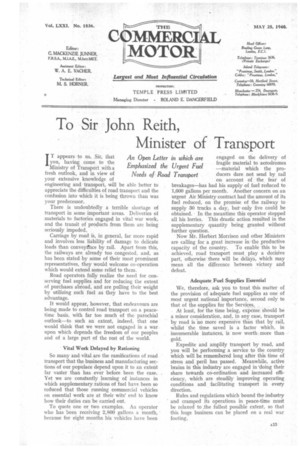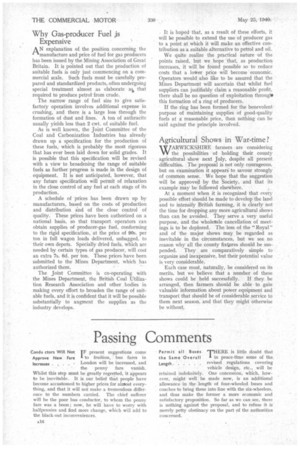To Sir John Reith, Minister of Transport
Page 17

Page 18

If you've noticed an error in this article please click here to report it so we can fix it.
T appears to us, Sir, that you, having come to the Ministry of Transport with a fresh outlook, and in view of your extensive knowledge of engineering and transport, will be able better to appreciate the difficulties of road transport and the confusion into which it is being thrown than was your predecessor.
There is undoubtedly a terrible shortage of transport in some important areas. Deliveries of materials to factories engaged in vital war work, and the transit of products from them are being seriously impeded.
Carriage by road is, in general, far more rapid and involves less liability of damage to delicate loads than conveytnce by rail. Apart from this, the railways are already too congested, and, as has been stated by some of their most prominent representatives, they would welcome co-operation which would extend some relief to them.
Road operators fully realize the need for conserving fuel supplies and for reducing the extent of purchases abroad, and are pulling their weight by utilizing such fuel as they have to the best advantage.
It would appear, however, that endeavours are being made to control road transport on a peacetime basis, with far too much of the parochial outlook—to such an extent, indeed, that one would think that we were not engaged in a war upon which depends the freedom of our peoples and of a large part of the rest of the world.
Vital Work Delayed by Rationing So many and vital are the ramifications of road transport that the business and manufacturing sections of our populace depend upon it to an extent far vaster than has ever before been the case. Yet we are constantly learning of instances in which supplementary rations of fuel have been so reduced that those running commercial vehicles on essential work are at their wits' end to know how their duties can be carried out.
To quote one or two examples. An operator who has been receiving 2,800 gallons a month, because for eight months his vehicles have been engaged on the delivery of fragile material to aerodromes —material which the producers dare not send by rail on account of the fear of breakages—has had his supply of fuel reduced to 1,600 gallons per month. Another concern on an urgent Air Ministry contract had the amount of its fuel reduced, on the promise of the railway to supply 30 trucks a day, but only five could be obtained. • In the meantime this operator stopped all his lorries. This drastic action resulted in the supplementary quantity being granted without further question.
Now Mr. Herbert Morrison and other Ministers are calling for a great increase in the productive capacity of the country. To enable this to be achieved, road transport must play a decisive part, otherwise there will be delays, which may mean• all the difference between victory and defeat.
Adequate Fuel Supplies Essential We, therefore, ask you to treat this matter of the provision of adequate fuel supplies as one of most urgent national importance, second only to that of the supplies for the Services.
At least, for the time being, expense should be a minor consideration, and, in any case, transport by road is ho more expensive than that by rail, whilst the time saved is a factor which, in innumerable instances, is now worth. more than gold.
Expedite and amplify transport by road, and you will be performing a service to the country which will be remembered long after this time of stress and peril has passed. Meanwhile, active brains in this industry are engaged in 'doing their share towards co-ordination and increased efficiency, which are steadily improving operating conditions and facilitating transport in every direction.
Rules and regulations which bound the industry and cramped its operations in peace-time must be relaxed to .the fullest possible extent, so that this huge business can be placed on a real war footing.
Why Gas-producer Fuel js Expensive
A N explanation of the position concerning the 'manufacture and price of fuel for gas producers has been issued by the Mining Association of Great Britain. It is pointed out that the production of suitable fuels is only just commencing on a commercial scale. Such fuels must be carefully prepared and standardized products, often undergoing special treatment almost as elaborate alp that required to produce petrol from crude.
The narrow range of fuel size to give satisfactory operation involves additional expense in crushing, and there is a large loss through the formation of dust and fines. A ton of anthracite usually yields less than 2 cwt. of suitable fuel.
As is well known, the Joint Committee of the Coal and Carbonization Industries has already drawn up a specification for the production of these fuels, which is probably the most rigorous that has ever been laid down for solid grades. It is possible that this specification will be revised with a view to broadening the range of suitable fuels as further progress is made in the design of equipment. It is not anticipated, however, that any future specification will permit of relaxation in the close control of any fuel at each stage of its production.
A schedule of prices has been drawn up by manufacturers, based on the costs of production and distribution i.nd of the close control of quality. These prices have been authorized on a national basis, so that transport operators can obtain supplies of producer-gas fuel, conforming to the rigid specification, at the price of 90s. per ton in full wagon loads delivered, unbagged, to their own depots. Specially dried fuels, which are needed by certain types of gas producer, will cost an extra 7s. 6d. per ton. These prices have been submitted to the Mines Department, which has authorized them.
The Joint Committee is co-operating with the Mines Department, the British Coal Utilization Research Association and other bodies in making every effort to broaden the range of suitable fuels, and it is confident that it will be possible substantially to augment the supplies as the industry develops. . It is hoped that, as a result of these efforts, it will be possible to extend the use of producer gas to a point at which it will make an effective contribution as a suitable alternative to petrol and oil.
We quite realize the practical nature of the points raised, but we hope that, as production increases, it will be found possible so to reduce costs that a lower price will become economic. Operators would also like to be assured that the Mines Department will ascertain that whilst fuel suppliers can justifiably claim a reasonable profit, there shall be no question of exploitation through, this formation of a ring of producers.
If the ring has been formed for the benevolent purpose of maintaining supplies of good-quality fuels at a reasonable price, then nothing can be said against the principle involved.
Agricultural Shows in War-time?
WARWICKSHIRE farmers are considering the possibilities of holding their county agricultural show next July, despite all present difficulties. The proposal is not only courageous, but on examination it appears` to savour strongly of common sense. We hope that the suggestion will be approved by the Society, and that its example may be followed elsewhere.
At a moment when it is recognized that every possible effort should be made to develop the land and to intensify British farming, it is clearly not the time for dropping any more agricultural shows than can be avoided. They serve a very useful purpose, and the wholesale cancellation of meetings is to be deplored. The loss of the "Royal" and of the major shows may be regarded as inevitable in the circumstances, but we see no reason why all the county fixtures should be suspended. They are comparatively simple to organize and inexpensive, but their potential value is very considerable.
Each case must, naturally, be considered on its merits, but we believe that a number of these shows could be held successfully. If they be arranged, then farmers should be able to gain valuable information about power equipment and transport that should be of considerable service to them next season, and that they might otherwise be without;




























































